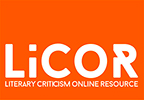First, it might be useful to try to define literature:
What is Literature?
Here, we try to approach the field of literature from a philosophical or theoretical point of view, in order to obtain an awareness of its particular nature.
If you think you already know what literature is, you may skip ahead to the more hands-on parts of this module, below.
How Literature Works; Language and Literature
In these sections we approach literature from a philosophical but also more practical angle. In order to understand how literature works, we need to understand that it is a linguistic art form, and that language itself possesses basic characteristics that determine what literature can and cannot do.
The next sections go into even more detail:
Representation
This section describes and discusses how literature can mimic or imitate both reality and other arts, and why that matters. It also deals with the importance of choosing the right words and placing them in the right order. We will be paying special attention to:
Tropes and Imagery
This section looks at how different types of literature employ verbal imagery:
Theme and Motif
Here, we look briefly at how we may critically summarize the issues and topics of a work of literature and how we know what those issues and topics are.
Intertextuality, Reference and Allusion
Having looked at how literature attempts to represent reality (and unreality), we also need to look at how it relates to other literature, and to the other arts, like the visual arts, film, television, sculpture, religious texts and so on. Often, literature will seek to say something about the truth by referring to some other artwork which has treated similar subjects.
Finally, when you have completed this module, you can go to:
Summary and Advice
Here you will find a summary of the points we have gone through and reflections around how this knowledge can be used in your dealings with works of literature, for your own amusement or in the context of academic study.
While these topics can be studied in whichever order you prefer, we recommend that you read them in the order presented. If you wish to proceed in reading them in such an order, click the link at the lower right-hand side of the page to continue.
Next: What is Literature?
